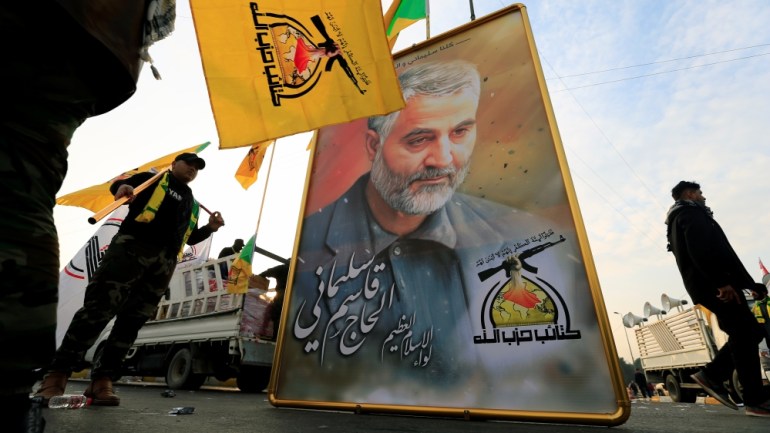United States President Donald Trump has blamed Iran for a rocket attack on the US embassy in Baghdad and threatened a military response if any Americans are killed.
In Sunday’s attack, a volley of rockets hit the US embassy in Baghdad’s heavily fortified Green Zone, Iraq’s military said, sparking fears of renewed unrest.
An Iraqi military statement said an “an outlawed group” launched eight rockets hitting the Green Zone, injuring one Iraqi security officer damaging cars and a residential complex.
“Our embassy in Baghdad got hit Sunday by several rockets,” Trump said on Twitter, referring to an attack that caused damage but no deaths. “Guess where they came from: IRAN,” he added.
“Now we hear chatter about additional attacks against Americans in Iraq … Some friendly health advice to Iran: If one American is killed, I will hold Iran responsible. Think it over,” Trump said.
There is increased concern at the White House about what Iranian-backed forces in Iraq might do in the lead up to the January 3 anniversary of the US assassination of Iranian General Qassem Soleimani.
In the wake of the Sunday’s rocket attack, Acting Defense Secretary Chris Miller, Secretary of State Mike Pompeo and National Security Advisor Robert O’Brien met at the White House on Wednesday to prepare a “range of options” for the president aimed at deterring further attacks, a senior Trump administration official told the Reuters news agency.
“Each one is designed to be non-escalatory and to deter further attack,” the official said.
The aim of the White House meeting was “to develop the right set of options that we could present to the president to make sure that we deter the Iranians and Shia militias in Iraq from conducting attacks on our personnel,” the official said.
In a statement, the US Central Command said the December 20 rocket attack on the Green Zone in Baghdad “was almost certainly conducted” by an Iranian-backed militia.
“The United States will hold Iran accountable for the deaths of any Americans that result from the work of these Iranian-backed rogue militia groups,” Central Command spokesman Navy Captain Bill Urban said.
Iran Foreign Ministry spokesman Saeed Khatibzadeh condemned the latest rocket attack in a tweet on December 21, refuting US accusations “which blatantly aim to create tension”.
Separately, the Axios news service reported on Tuesday that the Trump administration is considering quickly closing the US embassy in Baghdad as a prelude to a response, citing sources familiar with the discussion.
Ambassador to Iraq Matthew Tueller, a career diplomat, could be relocated to either Erbil, in a Kurdish region in northern Iraq, or the Al Asad Air Base in western Iraq.
An array of militia groups announced in October that they had suspended rocket attacks on US forces on condition that Iraq’s government present a timetable for the withdrawal of American troops from the country.
The US is slowly reducing its 5,000 troops in Iraq. But a rocket raid on the US Embassy on November 18 signalled that Iranian-backed militias had decided to resume attacks on US bases, according to Iraqi security officials.
 In this file photo from January 2020, members of the Iran-backed Kataib Hezbollah militia in Iraq hold the picture of the Iranian Major-General Qassem Soleimani [File: Thaier al-Sudani/Reuters]
In this file photo from January 2020, members of the Iran-backed Kataib Hezbollah militia in Iraq hold the picture of the Iranian Major-General Qassem Soleimani [File: Thaier al-Sudani/Reuters]Following the attack, Soleimani’s replacement, Quds Force General Esmail Qaani reportedly travelled to Baghdad to instruct Iraqi factions to cease attacks on US targets.
“Qaani made it clear that Trump wants to drag the region into an open war before leaving, to take revenge on his opponents over losing the election, and it is not in our interest to give him any justification to start such a war,” a senior Shia faction commander told the Middle East Eye news outlet.
The Trump administration in recent weeks has imposed additional economic sanctions on Iran and the US has also increased its military presence in the Gulf region.
A nuclear-powered submarine, the USS Georgia, escorted by two guided-missile cruisers, transited the Strait of Hormuz into the Gulf on December 21, the US Navy announced.
The Navy did not describe its mission but the submarine is equipped with cruise missiles and carries a Navy SEAL special forces team.
Over the past month, the Pentagon has ordered a series of long-range flights of B-52 bombers from the US to the Gulf region in an intentional show of force.
The US deployed the USS Nimitz to the Gulf at the end of November after Iran swore to revenge the killing of its nuclear scientist Mohsen Fakhrizadeh.
Comments
Post a Comment